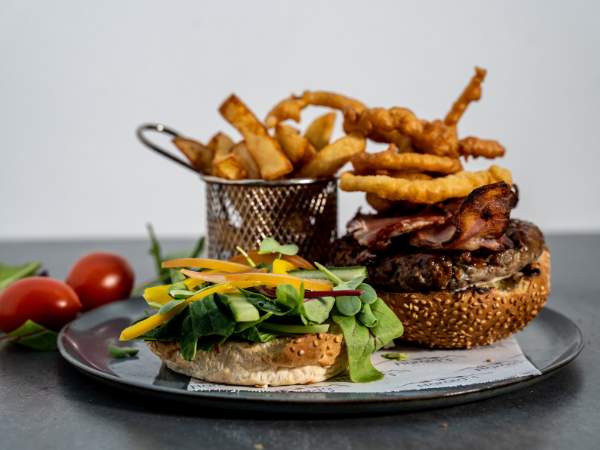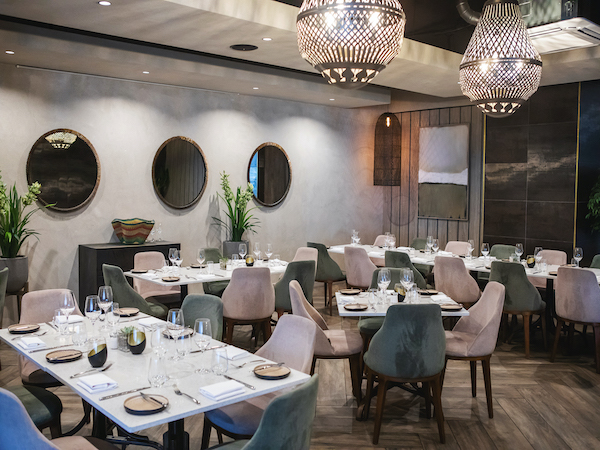News
Disaster management: planning and preparedness for restaurant restoration
Monday, November 27th, 2023While running a restaurant has its own set of challenges, South African restaurants have been hit with an unprecedented number of calamities in the past three years. From COVID-19, to riots, taxi strikes, load shedding, floods and a severe egg shortage, the restaurant industry continues to count the relentless stream of revenue loss due to business disruption. Despite this, restaurants have proven their resilience to adapt, endure and thrive against all odds. The ability to weather any storm, however, requires effective contingency planning for preparedness and swift recovery.
Devastating floods
In the aftermath of the devastating floods in the Western Cape in September, approximately 60% of businesses in the Cape Winelands and Overberg experienced temporary closures. The impact was especially harsh on restaurants who were still reeling from the destruction caused by the floods in June.
“The floods caused structural property damage to our deck area, restaurant interiors, kitchen and outside area, all of which we had recently refurbished after the floods in June. We were forced to close for four weeks for repairs, which meant having to cancel a few hundred covers in reservations and refunding these deposits,” discloses Richard Carstens, owner of Arkeste restaurant in Franschhoek.
View this post on Instagram
Le coin Français in Franschhoek was also forced to close for a week due to the floods and faced extensive stock loss due to electricity shortages following the storm. In Hermanus, the floods washed away a large section of the N2, cutting off restaurants like Farro, which was closed for six weeks and lost a sizeable amount of perishable stock during the 48-hour electricity outage following the storm. Creation Wines, too, was cut off to visitors, with sections of the Hemel-en-Aarde road being washed away or covered in debris, and was forced to close temporarily.
In Kalk Bay, Cape Town, popular restaurant Brass Bell saw huge waves flood the restaurant, crashing in through the windows and causing extensive damage to the entire lower level of the venue. “The physical damage to the property resulted in the closure of four damaged venues with a direct loss of trade for a period of three weeks in those affected spaces and further loss of footfall to the business overall for the remainder of September and the month of October due to public perception that we were closed, which resulted in over R1 million loss of revenue (over and above the cost of repairs and loss or damage of equipment to affected areas). Thankfully the layout of our venue meant that the upper-level dining spaces were still able to trade and did continue to do so during the storm and every day thereafter,” avers James Olckers, general manager, Brass Bell.
View this post on Instagram
Avian flu crisis
Around the same time, restaurants in Gauteng and KwaZulu-Natal were left reeling after a deadly strain of avian flu led to the culling of about 7.5 million chickens, resulting in a severe egg shortage. This sent egg prices soaring. Popular breakfast restaurants and bakeries were forced to look beyond their regular suppliers to other farms and retail stores to ensure a steady supply of eggs, often having to shell out double or triple the regular price.
“Especially at the start of the crisis, it was very stressful as we were not sure if we would even be able to buy eggs from anywhere. We ended up having to purchase eggs from Shoprite at an additional cost of 33% per egg,” says Larry Hodes, owner of renowned Johannesburg breakfast venue Arbour Café & Courtyard, which uses thousands of eggs per month.
View this post on Instagram
Salvation Café, a well-loved Johannesburg brunch spot, faced even bigger hurdles. “Besides the avian flu, half of our supplier’s coop also got stolen, so we had to find alternate sources of eggs. At one point we paid 140% more for one egg from Woolworths and now we are paying about 40% more for one egg, compared to what we used to pay before the outbreak,” states Remko van Niekerk, co-owner, Salvation Café.
Similarly, Johannesburg-based Just Teddy, which uses about 3 600 eggs per week for its restaurant, bakery and patisserie operations, took an immense hit to overhead costs in absorbing the exorbitant egg prices, just to ensure a constant supply of eggs. However, during the initial days of the egg shortage, the all-day breakfast restaurant was forced to stop serving breakfast at 12 noon and downsize some pastry lines in order to ‘budget’ egg supplies for use in bakery and confectionery production, Jeffrey Teddy Zaki, director, Just Teddy, informs us.
View this post on Instagram
Most breakfast hotspots and bakeries in Pretoria and Durban also reported a similar price increase of 20 to 35% for eggs during the past two months. However, the majority of these restaurants continued to serve eggs and did not resort to any egg substitutes, so as not to impact the quality of their offerings or disappoint customers. Moreover, the prices of egg-based dishes on the menu remained unchanged, so that customers did not feel the pinch.
While the egg crisis has somewhat improved after the government began importing eggs from October onwards, restaurants continue to pay a higher price for eggs to their suppliers as the egg shortage is set to persist till next year.
Crisis management
While planning for unforeseen crises such as floods and egg shortages may not be possible, effective disaster management and having a contingency fund in place is imperative to tide over any catastrophe.
“It is extremely important to always have at least one month’s total expenses earmarked for emergencies. Insurance, albeit important, usually has numerous terms and conditions in addition to time delays when registering claims. For a business, decaying profit is a slow killer, but lack of cash flow is like a heart attack and puts you out of business quickly,” remarks Richard of Arkeste.
Liz Marais, restaurant manager of Aroma Coffee in Brooklyn, Pretoria, concurs. “By having a contingency fund in place, you can respond quickly and effectively, which can help you maintain the trust and loyalty of your customers.” With 70% of its menu being egg-based, this fund helped the restaurant obtain a steady supply of eggs even though prices doubled during the height of the egg shortage.
View this post on Instagram
However, having a nest egg is not always possible for smaller restaurants operating on wafer-thin margins and already struggling to maintain profitability, what with the rising overhead costs of load shedding, inflation, higher food costs, and other issues.
Planning ahead
Having an action plan in place that can be quickly implemented to tackle a crisis is also essential in mitigating business continuity loss.
“Planning is always the key in these situations, as is setting systems in place before such events happen to ensure a smooth and effective response and limited losses,” remarks Darren Badenhorst, proprietor and head chef, Le coin Français.
Adds James of Brass Bell, “While we do not have a contingency fund specific to crisis management, we have a reserve of funds readily available for repairs, restoration and staff financing. Additionally, we have an SOP manual with critical steps in place and guidelines for dealing with a crisis as it arises. Management and staff are trained accordingly with seasonal drills and exercises in crisis management to ensure that our response in these situations is seamless and efficient.”
Another important factor in disaster management is maintaining good relationships with suppliers and all stakeholders who can be of great assistance in troubled times. “Thanks to our excellent relationship with our supplier, we were given preference in terms of egg supply and were thus able to maintain stock throughout the egg shortage and continued serving eggs and egg products to customers,” avers Alicea Malan, owner of Gauteng-based Lucky Bread Company, which uses about 14 400 eggs per month.
View this post on Instagram
Effective communication
Effective communication to customers is vital in handling crises. “Communication to customers is of utmost importance to alert them to the situation at hand. This also has a direct impact on whether or not a customer will return to the restaurant,” explains Jaco Landsberg, restaurant manager of Pretoria-based Harrie’s Pancakes, which also took a severe hit to profitability due to the prohibitive egg prices.
Narrating how communication helped post their reopening after the floods, Carolyn Martin, co-founder and marketing director, Creation Wines, says, “Communication was vital to assure our guests that we were open and could offer our full menus and wine tasting experience. We posted alternative routes to Creation on social media and contacted local guides and tour operators to let them know we were trading. We also provided alternative options to visitors who could not reach us to enjoy Creation experiences at other venues.”
Team building
Having a strong team that can help pull through a crisis is critical, as is prioritising employee wellbeing and ensuring employees continue to get paid even when a restaurant is forced to temporarily shut. “We had to do something to create some revenue to look after our staff in the interim while Farro was closed for six weeks due to the floods. So we held a couple of Farro dinners at our tiny pizza restaurant, Lina by Farro, and a two-day pop-up at Publik Wine Bar in Cape Town,” reveals Alex Windebank, owner and head chef, Farro.
View this post on Instagram
Creation Wines provided assistance to employees whose homes had been damaged in the floods and supplied them with 25-litre water containers during the week-long water cut in Hermanus after the storm. Moreover, the establishment took advantage of the downtime to continue staff training on their sommelier courses, alcohol awareness, diversity and conflict resolution.
Solidarity in calamity
Nothing brings a community together quite like a crisis and in a shining gesture of solidarity and camaraderie, restauranteurs went out of their way to assist their peers who were struck by recent adversity.
While Chamonix Wine Farm immediately initiated and implemented repairs at Arkeste following the floods, Tokara held a benefit wine-pairing dinner in association with distinguished chefs to contribute to Arkeste’s restoration and recovery. According to Darren of Le coin Français, “In true Franschhoek spirit, our neighbours assisted with storage of our fresh and frozen goods when we were forced to temporarily close, namely, my good friend Ryan Shell who owns Oku, Yama and Eleven.” As for Creation Wines, despite suffering their own losses, the venue’s chefs provided soup to the Caledon community for two days following the disastrous floods.
View this post on Instagram
Likewise, Lucky Bread Company in Gauteng, who were able to secure a regular supply of eggs during the egg shortage, helped other restauranteurs who were struggling to source eggs.
Staying positive
While such stories of hope are a true testament to the indefatigable and indomitable spirit of South African restauranteurs, having a positive and solution-oriented mindset when assessing damages and business loss is equally important in the ability to bounce back after a crisis. Last but not least, staying calm and true to the business and brand even in times of distress also aids in quicker recovery.












